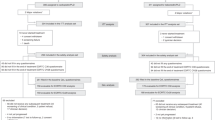Abstract
Pharmacokinetics of the cisplatin analogue carboplatin were studied in patients with disseminated ovarian and testicular cancer. Carboplatin 750 mg m-2 divided over three consecutive days was given as part of an ablative combination regimen followed by autologous bone marrow transplantation. Platinum (Pt) in plasma, plasma ultrafiltrate and urine was determined up to 96 h after the last drug dose by atomic absorption spectrometry. Carboplatin was measured by high performance liquid chromatography. The curves of ultrafiltrated Pt and carboplatin decayed in a bio-exponential way with t1/2 alpha of respectively 65 and 70 min and t1/2 beta of respectively 378 and 1014 min. The volumes of distribution (Vdss) were 18 and 25 l m-2, respectively, and total body clearances (ClTB) 79 and 65 ml min-1 m-2. Both curves overlapped when corrected for the Pt content of carboplatin. A diversion with the three-exponential curve of total Pt occurred between 3 and 6 h. After 10 h approximately 30% of the plasma Pt was protein bound. Total Pt had a larger Vdss (117 l m-2) and a lower total body clearance (14 ml min-1 m-2) than free Pt and carboplatin. Fifty-three per cent of the i.v. administered carboplatin was excreted in the urine in the first 6 h. Plasma ultrafiltrated Pt and carboplatin decreased to undetectable levels within 48 h, but total Pt was detectable until 96 h after the last carboplatin dose. However, this Pt is already bound to protein and unlikely to be cytotoxic to reinfused haemopoietic stem cells, so bone marrow reinfusion can be safely performed at 48 h after repeated dosing of carboplatin on three consecutive days.
This is a preview of subscription content, access via your institution
Access options
Subscribe to this journal
Receive 24 print issues and online access
$259.00 per year
only $10.79 per issue
Buy this article
- Purchase on Springer Link
- Instant access to full article PDF
Prices may be subject to local taxes which are calculated during checkout
Similar content being viewed by others
Author information
Authors and Affiliations
Rights and permissions
About this article
Cite this article
Mulder, P., de Vries, E., Uges, D. et al. Pharmacokinetics of carboplatin at a dose of 750 mg m-2 divided over three consecutive days. Br J Cancer 61, 460–464 (1990). https://doi.org/10.1038/bjc.1990.101
Issue Date:
DOI: https://doi.org/10.1038/bjc.1990.101
This article is cited by
-
A phase I and pharmacokinetics study of prolonged ambulatory-infusion carboplatin
Cancer Chemotherapy and Pharmacology (1995)
-
Clinical pharmacokinetics of carboplatin in children
Cancer Chemotherapy and Pharmacology (1994)



